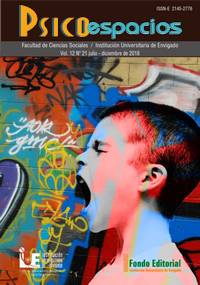Construction and validation of the scale of engagement to school tasks in classes for the students of the primary level of education
DOI:
https://doi.org/10.25057/21452776.1079Keywords:
engagement, school, interest, self-regulation, assessment, school tasksAbstract
This paper presents the process of construction and validation of an instrument to assess the engagement of students to school tasks in the primary education classes. The construction of the scale includes items incorporated by other instruments in the fra-mework of research on participation, interest and self-regulation in primary schools, ac-cording to three dimensions, namely: affective, behavioral and cognitive engagement. Participating in the study were 339 primary school students from the Department of Río Cuarto, Córdoba, Argentina. The results obtained from the confirmatory factor analysis show that the data collected are adjusted to the three factor model. They also meet acceptable levels of reliability. In this way, the instrument constructed and adap-ted has psychometric characteristics appropriate to the study context.
Author Biographies
Daiana Yamila Rigo, Licenciada en Psicopedagogía, Magíster en Piscología de la Educación y Doctora en Psicología. Docente de la UNRC e investigadora asistente del CONICET, Argentina
Danilo Donolo, Maestro Normal Nacional, Profesor y Licenciado en Ciencias de la Educación y Doctor en Ciencias de la Educación. Profesor consulto de la UNRC e investigador principal del CONICET, Argentina
References
Appleton, J., Christenson, S., Furlong, M. (2008). Student engagement with school: critical conceptual and methodological issues of the construct. Psychology in the Schools, 45(5): 369-386. https://doi.org/10.1002/pits.20303
Chistenson, S. Reschly, A., Wylie, C. (2012). Preface. En S. Chistenson, A. Reschly, & C. Wylie (Edits.). Handbook Research on Student Engagement (pp. V-IX). New York: Springer.
Cuevas, R., Sánchez-Oliva, D., Fernández-Bustos, J. G. (2016). Adaptación y validación de la Escala de compromiso agéntico al contexto educativo español. Revista Mexicana de Psicología, 33(2), 135-142. https://www.redalyc.org/articulo.oa?id=243056044005
Eccles, J., Adler, T., Futterman, R., Goff, S., Kaczala, C., Meece, J.,
Midglay, C. (1983). Expectancies, values, and academic behaviors. En J. Spence (ed.) Achievement and achievement motives (pp. 75-146). San Francisco: W. H. Freeman.
Fernández Pulido, R. (2008). Modelos de medida y análisis factorial confirmatorio. En M., Verdugo, M. Crespo, M. Badía & B. Arias (Coord). Metodología en la investigación sobre discapacidad. Introducción al uso de las ecuaciones estructurales, (pp. 29-41). Salamanca: Publicaciones del INICO.
Finn, J. (1993). School engagement & student at risk. Washington, DC: National Center for Educational Statistics, Departmnet of Education. Recuperado http://nces.ed.gov/pubs93/93470a.pdf
Fredricks, J., McColskey, W. (2012). The Measurement of Student Engagement: A Comparative Analysis of Various Methods and Student Self-report Instruments. En S. Chistenson, A. Reschly, & C. Wylie (Edits.). Handbook Research on Student Engagement (pp. 763-782). New York: Springer.
Fredricks, J. A., Filsecker, M., Lawson, M. A. (2016). Student engagement, context, and adjustment: Addressing definitional, measurement, and methodological issues. Learning and Instruction, 43, 1–4. doi: 10.1016/j.learninstruc.2016.02.002
Fredricks, J., McColskey, W., Meli, J., Mordica, J., Montrosse, B., Mooney, K. (2011). Measuring student engagement in upper elementary through high school: a description of 21 instruments. Washington, DC: U.S. Department of Education, Institute of Education Sciences, National Center for Education Evaluation and Regional Assistance, Regional Educational Laboratory Southeast. Recuperado http://ies.ed.gov/ncee/edlabs
Fredriscks, J., Blumenfeld, O. & Paris, A. (2004). School Engagement: Potential of the concept state of the evidence. Review of Educational Research, 74 (1): 59-109. https://doi.org/10.3102/00346543074001059
Gónzalez. N., Abad, J., Lèvy, J.P. (2006). Normalidad y otros supuestos en análisis de covarianzas. En J. Lévy. (Edit.): Modelización con estructuras de covarianzas (pp. 31-57). La Coruña: Netbiblo.
Greene, B. A. (2015). Measuring Cognitive Engagement with Self-Report Scales: Reflections from over 20 years of research. Educational Psychologist, 50(1), 14–30. Recuperado http://dx.doi.org/10.1080/00461520.2014.989230
Hart, S., Stewart, K., Jimerson, S. (2011). The Student Engagement in Schools Questionnaire (SESQ) and the Teacher Engagement Report Form-New (TERF-N): Examining the Preliminary Evidence. Contemporary School Psychology, 15: 67-79. https://link.springer.com/article/10.1007/BF03340964
Kong, Q., Wong N., Lam, C. (2003). Student engagement in mathematics: Development of instrument and validation of construct. Mathematics Education Research Journal, 15 (1): 4-21. https://link.springer.com/article/10.1007/BF03217366
Krueger, R.F., Kling, K.C. (2000). Self-report. En A.E. Kazdin (Ed.). Encyclopedia of Psychology, 7 (pp. 220-224). New York: Oxford University Press
Lester, D. (2013). A Review of the Student Engagement Literature. Focus on Colleges, Universities and Schools, 7 (1). Recuperado http://www.nationalforum.com/Electronic%20Journal%20Volumes/Lester,%20Derek%20A%20Review%20of%20the%20Student%20Engagement%20Literature%20FOCUS%20V7%20N1%202013.pdf
Marsch, H., Hocevar, D. (1985). Application of Confirmatory Factor Analysis to the Study of Self-Concept. First- and Higher Order Factor Models and Their Invariance Across Groups. Psychological Bulletin, 97(3), 562-582. http://dx.doi.org/10.1037/0033-2909.97.3.562
Newmann, F. M. (1986). Priorities for the future: Toward a common agenda. Social Education, 50(4): 240–250. https://eric.ed.gov/?id=EJ335096
Newmann, F., Wehlage, G., Lamborn, S. (1992). The significance and sources of student engagement. En D. M., Newmann (ed.). Student engagement and achievement in american secondary schools (pp. 11-39). New York: Teachers College Press.
Orgaz Baz, B. (2008). Introducción a la metodología SEM: conceptos y propósitos fundamentales. En M., Verdugo, M. Crespo, M. Badía & B. Arias (Coord). Metodología en la investigación sobre discapacidad. Introducción al uso de las ecuaciones estructurales, (pp. 14-28). Salamanca: Publicaciones del INICO.
Reeve, J. (2013). How Students Create Motivationally Supportive Learning Environments for Themselves: The Concept of Agentic Engagement. Journal of Educational Psychology, 105 (3): 579–595. http://dx.doi.org/10.1037/a0032690
Reschly, A., Christenson, S. (2012). Jingle, Jangle, and Conceptual Hazines: Evolutions and Future Direction of the Egaggement Construct. En S. Chistenson, A. Reschly, & C. Wylie (Edits.). Handbook Research on Student Engagement (pp. 3-19). New York: Springer.
Rigo, D. (2017). Docentes, tareas y alumnos en la definición del compromiso: investigando el aula de nivel primario de educación. Educação em Revista, 33: 1-24. Recuperado http://dx.doi.org/10.1590/0102-4698154275
Rigo, D., Donolo, D. (2014). Entre pupitres y pizarrones. Retos en educación primaria: el aprendizaje con compromiso. Educatio Siglo XXI, 32 (2): 59-80 59. Recuperado http://dx.doi.org/10.6018/j/202161
Ruiz, M., Pardo, A., San Martín, R. (2010). Modelos de educaciones estructurales. Papeles del Psicólogo, 31(1), 34-45.
Shernoff, D., Kelly, S., Tonks. S., Anderson, B., Cavanagh, R., Sinha, S., Abdi, B. (2016). Student engagement as a function of environmental complexity in high school classrooms. Learning and Instruction, 43: 52-60. Recuperado https://doi.org/10.1016/j.learninstruc.2015.12.003
Sperling, A., Ramsay, C., Reeves, P., Follmer, D., Richmond, A. (2016). Supporting students’ knowledge construction and self-regulation through the use of elaborative processing strategies. Middle School Journal, 47 (3): 25-32. Recuperado http://dx.doi.org/10.1080/00940771.2015.1135099
Sperling, R., Howard, B., Miller L., Murphy, C. (2002). Measures of Children’s Knowledge and Regulation of Cognition. Contemporary Educational Psychology, 27: 51–79. doi:10.1006/ceps.2001.1091
Toll, K., Drefs, M., Lock, J. (2016). Measuring cognitive engagement. The Canadian Journal for Teacher Research. Recuperado https://www.teacherresearch.ca/search?text=toll
Zapata Rotundo, G., Canet Giner, T. (2008). Propuesta metodológica para la construcción de escalas de medición a partir de una aplicación empírica. Revista Electrónica Actualidades Investigativas en Educación, 8 (2): 1-26. Recuperado http://www.redalyc.org/articulo.oa?id=44713044004
How to Cite
Downloads
Languages:
esDownloads
Published
Issue
Section
License
Copyright (c) 2018 Institución Universitaria de Envigado

This work is licensed under a Creative Commons Attribution-NonCommercial-ShareAlike 4.0 International License.
| Article metrics | |
|---|---|
| Abstract views | |
| Galley vies | |
| PDF Views | |
| HTML views | |
| Other views | |





